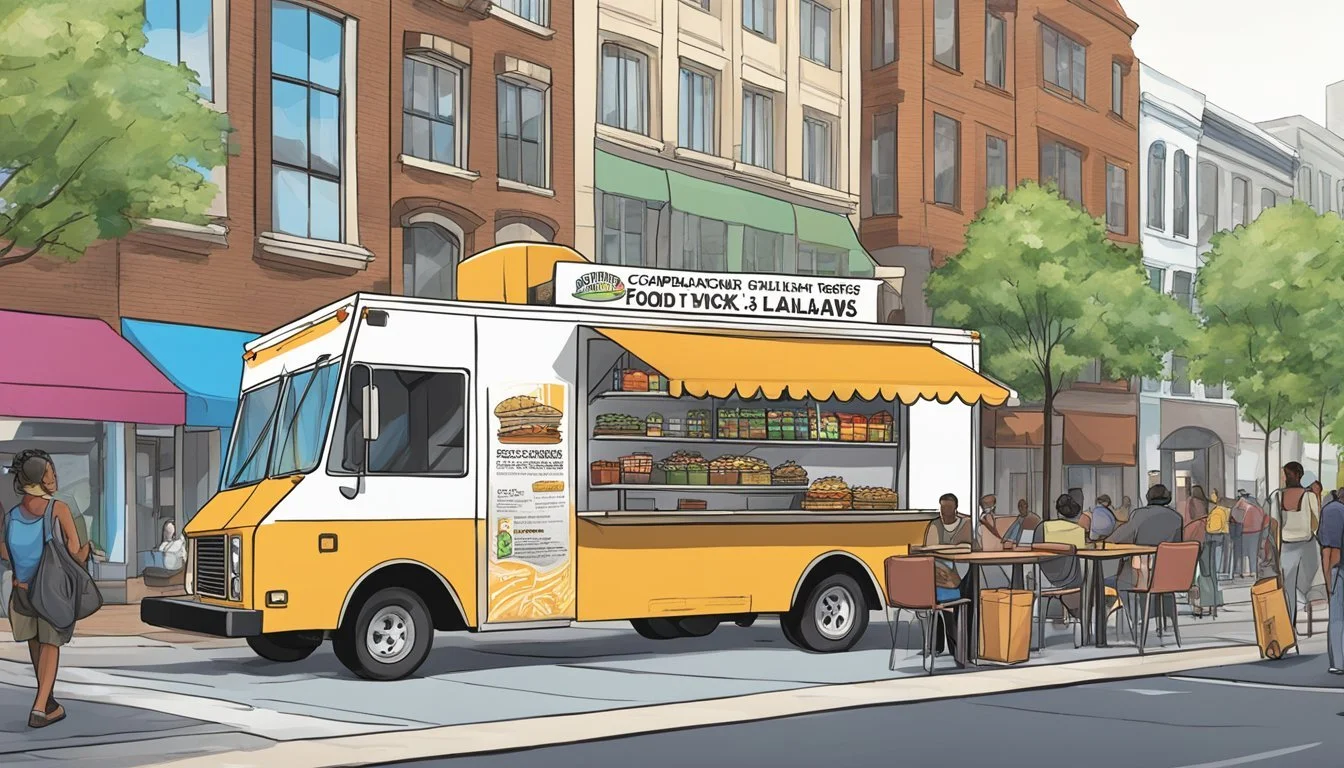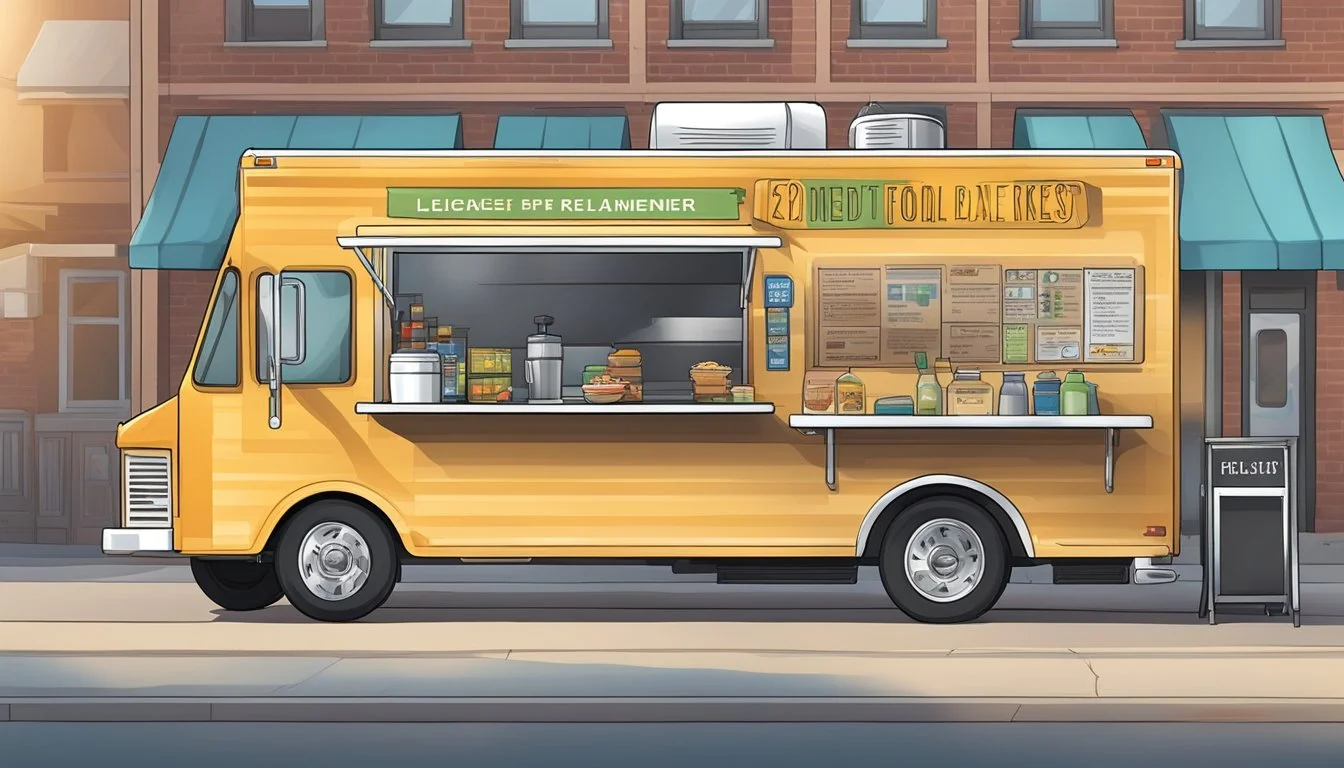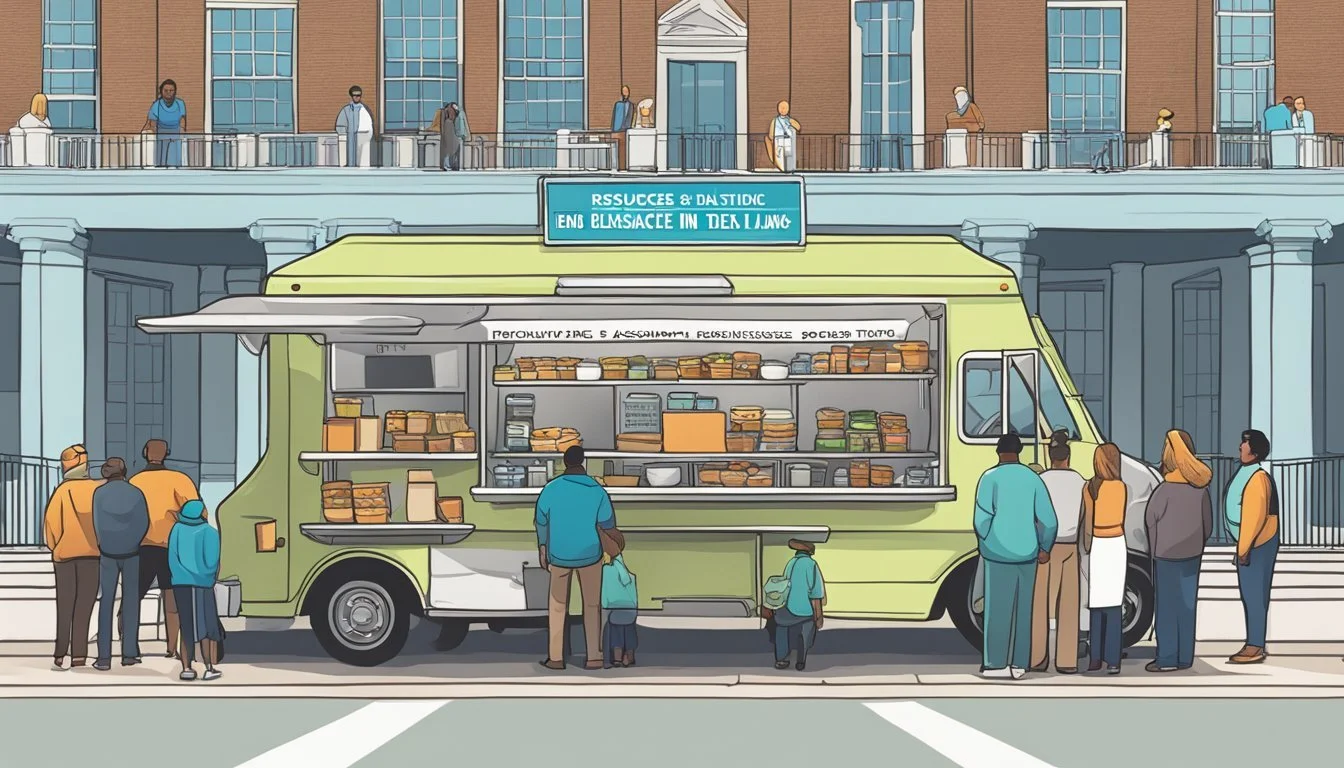Food Truck Laws in Delaware
Understanding Regulations for Mobile Vendors
Operating a food truck in Delaware involves navigating a specific set of laws and regulations designed to manage the food service industry at a mobile level. Delaware's approach to controlling the operation of mobile food establishments, including food trucks, ensures food safety, proper hygiene, and adherence to local business practices. The state government requires food trucks to obtain several types of permits and licenses, which adhere to guidelines that protect public health and ensure the welfare of both consumers and businesses in the food truck sector.
The regulations food truck owners must comply with range from health and safety to parking and zoning laws. Delaware’s Division of Public Health is responsible for issuing permits to food establishments, and prospective food truck operators are encouraged to contact the Food Protection Office to understand the necessary steps involved in legally operating their business. The process includes ensuring compliance with food safety ordinances, tax laws, and other state-level regulations.
Moreover, Delaware passed the Mobile Food Vehicle Act to streamline the legalities around such enterprises. This act stipulates the criteria that mobile food establishments must meet to operate legally. Entrepreneurs who venture into the food truck business must undertake a market search, develop a strategy, and then align their business in accordance with Delaware’s regulatory framework. Understanding and adhering to these legal requirements is a critical step for anyone looking to establish a successful food truck business in Delaware.
Delaware Food Truck Industry Overview
The Delaware food truck scene is an emerging market with a landscape that offers both competitive challenges and significant opportunities for entrepreneurs.
Market Trends
In Delaware, there is a noticeable shift towards mobile eateries, with a growing preference for gourmet and specialty cuisine on wheels. Recent years have seen an upswing in the popularity of food trucks, which are now a staple at local festivals and street fairs. This move aligns with the national trend of consumers seeking fresh, fast, and diverse dining options.
Competition Landscape
The food truck industry in Delaware faces a dynamic competition landscape. New entrepreneurs are entering the market, inspired by the potential for lower overhead costs compared to traditional brick-and-mortar establishments. However, these businesses must navigate through a maze of regulations and compete with established food trucks and restaurants for prime locations and customer loyalty.
Business Potential
Delaware's food truck entrepreneurs can tap into a market rife with business potential. The state's favorable tax laws, including the absence of a state sales tax, can positively impact overall price points and profit margins. To capitalize on the business potential, understanding the specific permit requirements and investing in strategic marketing to stand out during busy festivals are critical factors for success.
Legal Framework
In Delaware, the operation of food trucks is governed by a variety of legal structures that ensure public health and safety. These laws and regulations are enforced at the state, federal, and local levels.
State and Federal Regulations
State and federal regulations provide a foundation for food truck operations. At the federal level, the United States Food and Drug Administration (FDA) sets out guidelines which are adapted at the state level. The Delaware Division of Public Health requires food trucks to comply with these adapted guidelines to ensure food safety and sanitation standards are met.
Delaware Food Code
The Delaware Food Code is a set of regulations specifically designed to address public health concerns related to food establishments, including food trucks. This code requires a permit from the Division of Public Health’s Food Safety Program before a food truck can operate. Operating without a permit is a serious offense, subject to legal repercussions.
Local City and County Laws
Within Delaware, individual cities and counties may enforce additional local laws and zoning regulations for food trucks. These laws often cover the specific locations where food trucks can operate and the times they are allowed to do so. Food truck owners must be aware of these local regulations, as failure to adhere to them can lead to penalties, including fines and the potential shutdown of their operations. Operable locations and times can vary significantly from one jurisdiction to another, highlighting the importance of local knowledge.
Starting a Food Truck Business
Starting a food truck business in Delaware demands careful planning and preparation. Entrepreneurs must develop a business plan, select the right food truck, and secure necessary funding to establish a successful enterprise.
Business Planning
A strong business plan is the cornerstone for any new venture, particularly in the highly competitive food truck industry. It should outline the business concept, menu, target market, and operational strategy. Entrepreneurs may find comprehensive guidelines on crafting this plan by visiting 5 Food Truck Licenses and Permits Required in Delaware (2024). Market research is critical to understand the local food truck landscape and tailor the business to the demands of Delaware consumers.
Choosing the Right Food Truck
Selecting a food truck that fits the business needs can take time, and it is one of the most significant investments for a food truck entrepreneur. Factors to consider include the size and type of vehicle, kitchen equipment, and the layout for efficient service. The state of Delaware dictates specific requirements for food trucks, which need to be addressed to comply with regulations and ensure the truck is ready for food preparation and service.
Securing Financing
To fund a food truck business, entrepreneurs generally look at options such as bank loans, investors, or local grants. In Delaware, the cost of starting a food truck ranges significantly and requires a thorough understanding of the financial commitment. Entrepreneurs should investigate different loan options suited for the food truck businesses, and some may even reach out to Local Economic Development Organizations in Delaware for potential grants or incentives.
Licensing and Registration
In Delaware, operating a food truck business requires navigating through a series of mandatory licenses and registrations, ensuring compliance with state regulations. The process involves obtaining the right permits, registering the vehicle, and adhering to the health codes set by the state.
Obtaining Permits and Licenses
Food trucks in Delaware must acquire several key permits and licenses to operate legally. Initially, entrepreneurs must apply for a business license, which allows the operation of a commercial activity in the state. They also need to secure an Employer Identification Number (EIN) from the IRS for tax purposes. Moreover, Delaware demands that mobile food establishments comply with the State of Delaware Food Code; thus, acquiring a specific mobile food establishment permit from the Delaware Division of Public Health is essential. This permit assures that the food truck meets all safety and sanitary regulations outlined by the code. To start the permitting process, one can look into the guidelines provided by the Delaware Department of Health and Social Services.
Vehicle Registration
Any food truck operating on Delaware roads must be duly registered with the state's Division of Motor Vehicles (DMV), similar to any other vehicle. This ensures that food trucks meet the necessary safety standards for vehicles in addition to food service regulations. The registration process involves an inspection and payment of fees, which vary depending on the weight and type of the vehicle.
Health Department Compliance
The third pillar of operating a food truck in Delaware is to maintain compliance with the health department's standards. The Office of Food Protection plays a pivotal role in ensuring that food trucks adhere to the health and safety regulations. Food truck operators are required to undergo a plan review and regular inspections to ensure continuous compliance. All food handlers on the truck must also possess up-to-date food safety certifications to operate, aligning with the guidelines from the Food Truck Requirements in Delaware - Food Handler's Guide.
By adhering to these procedures, food truck proprietors in Delaware can ensure their business is legitimate and poised for success.
Operational Requirements
In Delaware, food trucks are subject to stringent operational requirements designed to ensure public health and safety. They include compliance with food safety laws, regular inspections, and strict standards for truck equipment and employee training.
Food Safety and Inspection
Food trucks in Delaware must adhere to the State of Delaware Food Code, which is based on national standards from the U.S. Food and Drug Administration. Regular inspections ensure that trucks maintain proper food storage, temperature control, and preparation standards to prevent foodborne illness. Compliance with food safety ordinances is mandatory.
Inspection Frequency: Random and scheduled inspections
Key Focus Areas: Temperature control, cross-contamination prevention, proper sanitation
Truck Equipment and Maintenance
A food truck's design and construction must meet specific regulatory requirements, including safety regulations for the maintenance and operation of the vehicle and all kitchen equipment. Proper waste disposal regulations and cleanliness are crucial to remain in compliance.
Essential Equipment Checklist:
Commercial grade cooking appliances
Refrigeration units for cold storage
Hot holding equipment for maintaining food temperatures
Sanitation stations for handwashing
Employee Training and Management
Food truck operators must ensure that their staff are well-trained in food safety procedures and manage daily operations effectively. This includes ongoing training in food handling and customer service to maintain high standards and reduce the risk of health violations.
Training Topics: Proper food handling, cleanliness, and customer interaction
Management Practices: Scheduling regular training updates, managing staff certifications
These guidelines are the foundation for operating a successful and legally compliant food truck business in Delaware.
Logistics and Location Strategy
When launching a food truck in Delaware, operators must strategically consider their logistics and location. Choice of area and adherence to local regulations play pivotal roles in the success of mobile food establishments.
Determining the Operating Area
Food truck owners in Delaware should select their operating area by researching towns and counties that are hospitable to mobile eateries. They must register their business with local institutions and ensure that their chosen locations do not conflict with town ordinances or county regulations. A detailed understanding of seasonal patterns and customer footfall within different locations is critical for sustained operation.
Lease and Parking Considerations
Securing a lease for a parking spot can provide a stable location for customers to find the food truck. It is essential for operators to negotiate terms that allow for flexibility in case of event opportunities or seasonal migrations. Furthermore, food truck owners must consider local area parking regulations and availability, ensuring they comply with specific location laws that govern mobile food units.
Food Truck Business Expansion
Expanding a food truck business in Delaware involves understanding the nuances of food truck law, carefully planning the scale of operation, and building strategic partnerships within the food industry.
Scaling the Business
Food truck owners in Delaware must consider the legal requirements for scaling up, which may include acquiring additional permits and licenses as the number of operational vehicles increases. They must ensure every employee acquires food handlers permits, and that new trucks meet all safety standards and possess the necessary mobile food facility permits. The team is central to the expansion process, requiring larger staff capacity and often necessitating a structured training program to maintain quality and compliance.
Building Partnerships
Creating partnerships is pivotal for food trucks looking to broaden their reach. Collaborations with local businesses, event organizers, and fellow food truck operators can lead to symbiotic relationships, enhancing visibility and patronage. A prime example of such collaboration is Rolling Revolution, Delaware's mobile vending association, which can provide a network of support and resource sharing among food entrepreneurs. Together, they can work towards fair laws and favorable conditions that benefit the food truck industry as a whole.
Marketing and Branding
Effective marketing and branding are crucial for a food truck's visibility and appeal. They shape the business's identity and influence consumer perception, directly impacting its ability to attract and retain customers in a bustling market.
Developing a Marketing Strategy
A robust marketing strategy considers the competitive landscape of Delaware’s food truck industry. A business name should be memorable and reflect the food truck's brand, resonating with the target market. Operators should consider which marketing channels are most effective for reaching their desired consumers, such as local advertising, social media platforms, and food festivals. Strategic partnerships and presence at community events can also enhance visibility. Moreover, having an understanding of Delaware's unique market helps fashion a strategy tailored to local preferences.
Building Customer Relationships
Customer loyalty is fundamental in the food truck business. By engaging with consumers through social media and customer feedback, food truck owners can build strong relations. Personalizing the customer experience, for instance, by rewarding regulars, or responding to online reviews helps foster a sense of community and encourages repeat business. Brand consistency in communication, appearance, and service quality fortifies the relationship between consumers and the food truck.
Financial Management
Efficient financial management is crucial for food truck operators in Delaware to maintain profitability and ensure compliance with state regulations.
Understanding Costs
When starting a food truck business, entrepreneurs must be aware of startup costs which include the purchase or lease of the food truck, kitchen equipment, and initial inventory. These expenses lay the foundation for the business and can significantly impact the overall budget. Moreover, business licenses and a state permit are mandatory, with their costs varying depending on the scope and location of the operation. Food truck owners should allocate funds for recurring costs such as ingredients, fuel, maintenance, and employee wages. Accurate financial records simplify managing these expenses and staying within the budget.
Managing Revenue Streams
To successfully manage revenue, food truck operators should develop a pricing strategy that accurately reflects their various costs, ensuring each menu item sold contributes to profitability. Setting the right price points involves a delicate balance between covering costs and offering value to customers. Operators should also diligently track sales to analyze performance and adjust the menu or prices accordingly. Additionally, understanding and adhering to Delaware's regulations on sales tax is pivotal Food Establishment Financial Transparency Laws to avoid penalties and ensure legal operation. Regular assessment of financial health helps sustain the business and supports growth opportunities.
Resources and Assistance
For entrepreneurs planning to start a food truck in Delaware, understanding the landscape of industry associations and available state and local resources is crucial. These entities provide an essential role in offering guidance, support, and information necessary for compliance and success in the mobile food industry.
Industry Associations
Industry associations play a pivotal role in offering educational resources and acting as a unified voice for food truck owners. They may provide members with updates on legislation, networking opportunities, and specialized training. While Delaware may not have a dedicated food truck association, national organizations can be valuable resources. Prospective food truck operators should consider associations such as the National Food Truck Association, which offers insights into the evolving food truck business landscape.
State and Local Resources
The Delaware Division of Public Health should be a primary contact for new food truck operators due to its authority over health and food safety regulations. Additionally, the Delaware Small Business Development Center (SBDC) is a crucial resource for entrepreneurs. They offer business consulting services, assistance with development plans, access to market research, and guidance on proper waste disposal regulations and OSHA regulations pertaining to food trucks.
Entrepreneurs can request for information regarding starting and managing a food truck through the SBDC's comprehensive assistance program. The Division of Public Health's Office of Food Protection offers clear guidance on food safety ordinances, including temperature control regulations and other public health laws. They also address any complaints or concerns related to food safety within the state's jurisdiction. For regulatory permits and licensing resources, contacting the Food Protection Office would be a recommended step for those in the initial stages of setting up a mobile food establishment.










